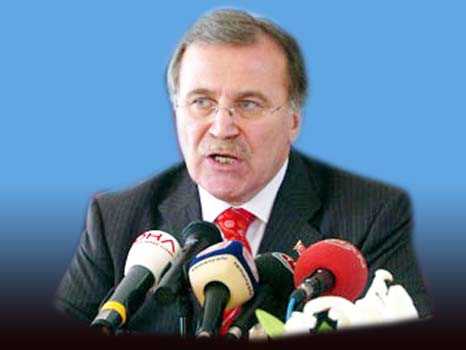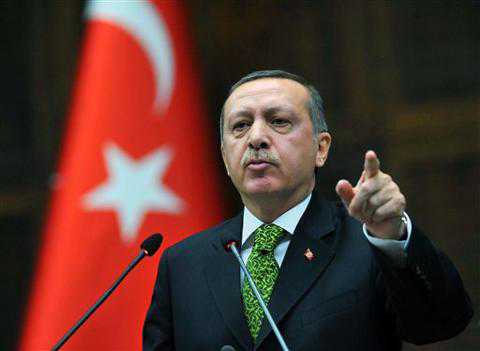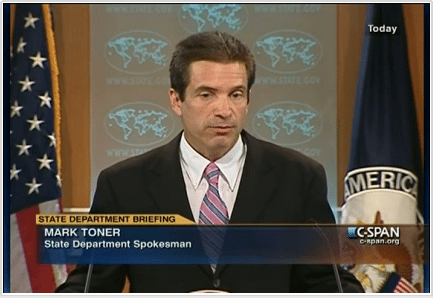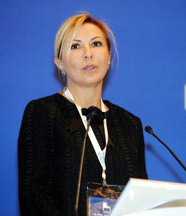Turkey calls for an alliance-led campaign to limit operations while France seeks a broader ‘coalition of the willing’
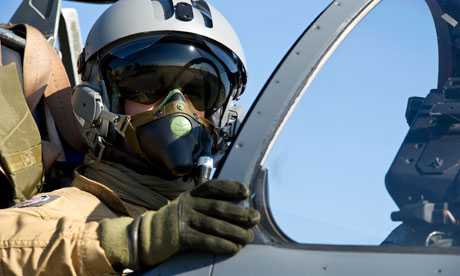
A flotilla of warships has begun patrolling the Mediterranean under Nato command to block attempts by Colonel Muammar Gaddafi to replenish his combat forces with arms and mercenaries.
But the attempt at a Nato show of unity in policing a UN arms embargo was undermined by a third day of squabbling at alliance headquarters in Brussels over who should be in charge of the air campaign.
Amid arguments over the scope and command of the air campaign against Tripoli, Turkey both blocked Nato planning on the no-fly zone and insisted that Nato be put in control of it, in order to be granted a veto over its operations, senior Nato officials said.
“Turkey blocked further planning while the coalition [of the willing] continues,” said a senior official. Ankara wants the broad coalition involved in the air campaign to cede control to Nato in order to limit its operations, the official added.
The Turks specifically called for a halt to air attacks on ground targets in Libya and signalled that agreement on this would be the price of their assent.
Germany, meanwhile, Europe’s biggest opponent of the Libya campaign, promptly pulled its Mediterranean naval forces out of Nato’s command.
The Turkish position put Ankara at odds with France, which has successfully thwarted strong US and British pressure to put Nato at the political helm of the air campaign overseeing the UN-decreed no-fly zone over Libya. Paris insisted that the governments of the “coalition of the willing” taking part in the strikes against Gaddafi’s military infrastructure would lead and make the decisions.
“It is important to make clear that the leadership is not Nato,” said Alain Juppé, the French foreign minister. “We see this as a UN operation under a UN mandate. It is implemented by a coalition of European, North American and Arab countries.”
Nato’s policy-making North Atlantic Council, grouping ambassadors of the 28 member states, met in Brussels for a third day to try to hammer out a facesaving deal amid frantic transatlantic diplomacy.
“We’ve not yet decided to go for a no-fly zone,” said a Nato official. “We’ve moved on from planning. That’s complete. But now the allies have to decide what decisions to take in terms of next steps.”
“Nato is ready to act if and when required,” said Oana Lungescu, the alliance spokeswoman. “These are difficult discussions on very difficult issues.”
Diplomats were optimistic that a deal would eventually be struck giving Nato military planners power to mastermind the operational side of the air campaign, while the strategic and political decision-taking on the aims and direction of the military effort would rest with what Paris called a “contact group” of participating governments. Officials from the countries involved are to meet in London next week.
“A wide and inclusive range of countries will be invited, particularly from the region. It is critical that the international community continues to take united and co-ordinated action in response to the unfolding crisis. The meeting will form a contact group of nations to take forward this work,” William Hague, the foreign secretary, said.
French president Nicolas Sarkozy, repeatedly accused of seeking to hijack the Libya operations for personal political reasons, maintains that handing political leadership of the campaign to the Nato alliance would alienate the Arab world.
Despite a green light from the Arab League for the UN decision on the no-fly zone, David Cameron admitted to MPs that Arab engagement in the anti-Gaddafi effort had been less than had been hoped.
“I can confirm that yesterday the Qataris deployed the first of their contribution – Mirage aircraft and other support aircraft – and we will get logistic contributions from countries such as Kuwait and Jordan,” he said. “I hope that further support will be forthcoming but I would like to be clear that because we had to act so quickly on Saturday it was not possible to bring forward as much Arab support as might have been welcomed.”
Since France carried out the first air strikes against Libya at the weekend, the US has been commanding the operations, in consultation mainly with the French and the British. President Barack Obama has made it repeatedly clear, however, that his interest in taking the lead is very short-term and that the best option would be for Nato to take over – a position strongly supported by Cameron but opposed by Sarkozy and also, for different reasons, by Germany and Turkey.
The US and British governments, following telephone diplomacy between Obama, Cameron, and Sarkozy late on Tuesday, are stressing that Nato is to be given “a key role” in the air campaign, signalling a partial climbdown away from granting the alliance the lead role.
Senior European diplomats argue that there is “no crisis of leadership” yet over the prosecution of the Libyan war effort. But the US impatience to surrender its lead role is exposing big divisions among the Europeans.
While Cameron and Sarkozy are the west’s leading hawks in the war effort against Gaddafi, they are seriously split over who should run things.
A European summit dinner on Thursday tonight in Brussels is to focus on Libya, with the British and French leaders expected to face a grilling from European sceptics, led by Germany, over the strategy, aims, and future course of the military effort.
via Libya no-fly zone leadership squabbles continue within Nato | World news | The Guardian.

